
Search for Death Records in Colorado
Free Colorado Death Records Lookup

We receive referral fees from partners (advertising disclosure)
The information we provide you is free of charge and a result of extensive research by our product experts. We use affiliate links in our site that provide us with referral commissions. While this fact may not influence the information we provide, it may affect the positioning of this information.


Our comprehensive guide to the death records in the state of Colorado will help you in finding death records as well as provide you with relevant information about the deceased and the life they lived.
Death Records in Colorado -
The Ultimate Guide 2025
- UPDATED December 2025
Colorado became a state in 1876 and at that time a law was passed requiring counties and towns to record deaths but not all counties complied. Statewide registration of deaths began in 1907 and was generally complied with by 1920. To search for death records, you will need to provide the time frame for which you wish to conduct the search.

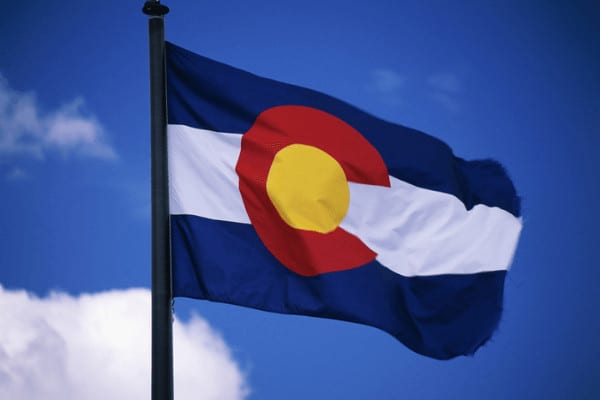
Colorado Death Databases
The Colorado Department of Health Services (ADHS) holds death records from the year 1876 to the present year. If you are in search of death records, you can get a hold of a death certificate for an individual who is deceased for at least half a century. Below are the various searches you can conduct:
Colorado Vital Records
Before 1876: There are no death records by state or county. You will need to use alternative sources including church records, census data, newspapers, probates, bible records, and cemetery records.
1876 to 1899: After acquiring statehood, Colorado started keeping death records, housed at county level. There is no complete index for these records, and alternative sources could come in handy. To conduct a search for death that occurred in this era, you must know the deceased’s exact county of death.
You will need to contact the county to obtain the death certificate.
1900 to date: In Colorado, all death records after 1899 are housed at the state level. There are two ways to obtaining the death certificate. If you know the exact date of death, you can contact the Colorado Department of Public Health and Environment. In a case where the exact date of death is unknown, try the United States Social Security Death Index or the United States Social Security Applications and Claims Index.
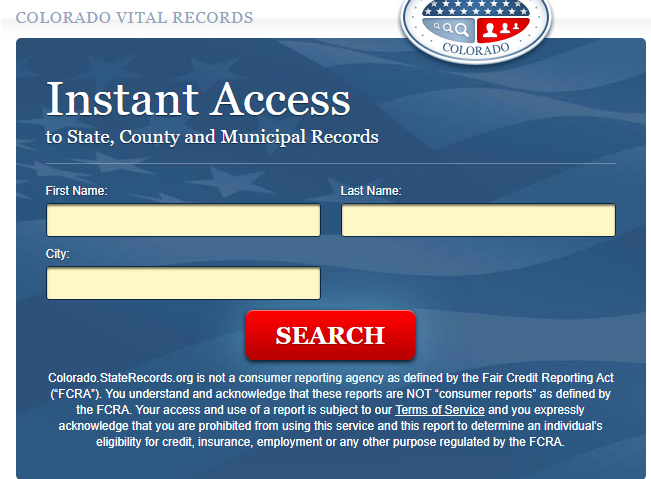
Death Records Defined
Death certificates are official documents that provide any relevant information about someone who is deceased. If you’re doing genealogical research, these records come in handy as they contain most of the information you’d need to learn more about your ancestry. Most death records are held by the state the deceased lived or died in, but they lack the burial state of the deceased. Both cemeteries and churches hold death records, as with state governments. Information you can obtain from death records includes the full name, date of birth, date of death, and place of death.
Death Certificates in Colorado
In obtaining a death certificate, the informant must provide all information on the application form at the next section of the kin or family. The coroner then provides other information including cause and death time. The funeral home is responsible for issuing death certificates. Just a few days after the deceased’s passing, you can get this vital document; the funeral home allows you to make death certificate copies.
Are Colorado Death Records Open to the Public?
According to the Colorado Revised Statutes, vital records such as birth records, divorce records, marriage records, adoption records, death records, and other life records are available to all eligible parties with a direct relationship to the person named on the record.
What Information Do I Need to Search for Colorado Death Records Online?
Requesters who wish to get a hold of a death record must be well acquainted with basic facts associated with it including:
- Deceased’s name
- Valid reason for death record request
- Death date
- County or city of death
- Valid proof of identification
Who Can Apply for A Death Certificate in Colorado?
Colorado is a “closed record” state. This means vital records are not public. As such, citizens’ confidentiality is protected under Colorado law restrictions on public access to vital records. A person must be 18 or older to obtain a certified copy of a death certificate.
The following persons can apply for a death certificate:
- Spouse or Immediate Family Member
- A family legal attorney
- An estate legal representative
- A Persons with Legal Interest attorney
- A legal 3rd Party
- A private Investigator
- A legal Genealogical Researcher
Why do states keep Death Records?
A couple of factors contribute to the preservation or retention of death records by states. The most important and most obvious reason is to indicate that the individual in question has passed away. The individual can then be removed from the voter registration list in this manner. It is possible for the state to inform a complainant that the individual whose property they are complaining about is deceased if they lodge a complaint about that person’s property, such as overgrown grass or trash not being removed from the property.
Another reason for states to maintain death records is to assist with court cases, which is a good thing. The absence of a will in most cases results in serious divisions among family members, which can be extremely difficult to reconcile after a death occurs. Obtaining a death certificate may be beneficial in settling some family matters. Death records are also useful in notifying the Internal Revenue Service of an individual’s death, which can then be used to assist with filing returns or taxes the following year.
The death certificate may put you in a position to transfer the deceased’s possessions to your name or the names of other beneficiaries, depending on the circumstances. This document is extremely important when it comes to the opening of a probate case. Additionally, the state of Colorado will keep death records to aid in the tracking of certain conditions and diseases that have a negative impact on the general public.
How to Find Colorado Death Records
Obtaining Colorado death records from Archives.com is the most dependable method of doing so. Following your registration for an account, you will have complete access to the death records for the state of Colorado as soon as you log in to the platform. The following are a few simple steps to get you started:
Step 1: Go to Archives.com and sign in using your email address and password. You will be required to enter both your password and the email address that you used during the signup process. Simply click on the link at the bottom of the page to create a user account if you haven’t already done so.
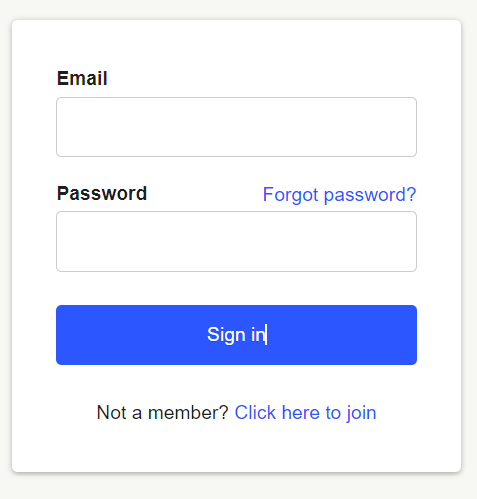
Step 2: Use the buttons at the very top of the user page to navigate through the options. When you click on the “Search” button, the Colorado state death records page is loaded.

Step 3: On the left-hand side of the page, you will notice a couple of buttons that you can click on. There are a couple of different options available for consideration and selection. Check the box next to “Vital Records,” then click on the “Death” button just below it. Thus, the site eliminates all other records and only displays death records, which you can then download.
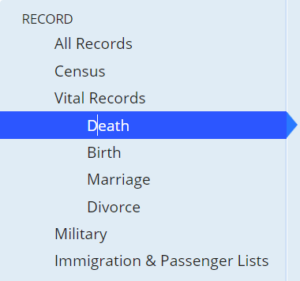
Step 4: Enter as much information about the deceased as you can remember about them. The last name of your ancestor can be used to conduct a basic genealogical search. Selecting the ‘Exact’ icon will limit the platform’s search results to only those records that contain the exact name that you typed in. If you would like to conduct a search on other records that have the same name as the one you provided, you can skip this step. If you want to be even more specific, the site allows you to enter the maiden and/or middle name of the deceased.

Step 5: The state of Colorado should be entered in the ‘Location’ box. As soon as you begin typing, you will notice that the website will provide a match for you. The site provides you with a number of options, including the ability to enter a birth or death date, as well as the ability to adjust the dates already entered. This is extremely useful, especially in an emergency situation where you are unsure of the exact date and time. Make sure to look through all of the collections. However, if you know exactly where a particular record can be found, you can search through the specific collections. Once you’ve finished, click on the blue ‘Search Now’ button.
Step 6: You will be presented with a list of records; you will need to scroll through the list until you find the person whose records you are interested in viewing. Some of the information that will be available in the records will include the individual’s birth date, death date, death location, as well as the location of their burial. You can find out which archives have the information you’re looking for by visiting the ‘collection’ section.
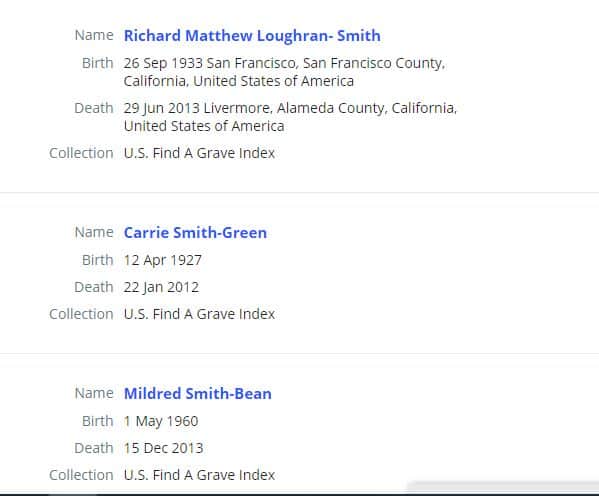
Step 7: Click on the name of the deceased to view the death record that is currently available online. In most cases, you will be able to obtain their full name as well as their maiden name if they were previously married. You can also find out about their burial arrangements, such as whether they were cremated or buried, and whether a biographical sketch is available. By clicking on the ‘view story’ button, you can find out more about the person who has passed away. You can learn a lot about someone by reading their story. You can learn when they were born, when they died, if they were married, whether their spouse is alive or deceased, the spouse’s name, any listed family members, and a lot more.
Step 8: Continue scrolling down the page until you find a section that lists all of the records that are available that are related to the individual you are looking for. More information can be found by clicking on any of the records that are currently available. You can find a list of all telephone directories that contain information about the individual’s marriage records or previous addresses at Archives.com.
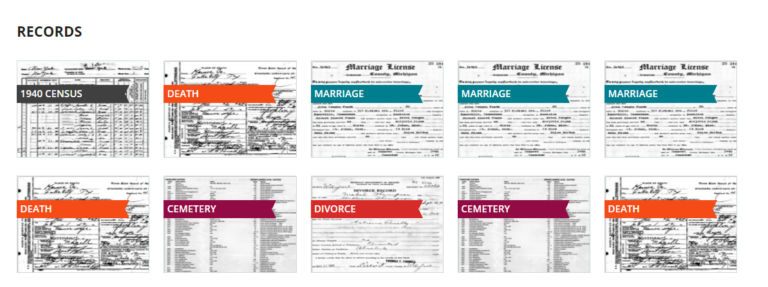
Alternative Sources for Colorado Death Information
- Resourceful websites
While Archives.com is a fantastic resource for searching death records in Colorado, there are a plethora of other websites that you may want to check out as well. The Social Security Administration of the United States is one such platform. While the Social Security Administration is responsible for sending Social Security payments to Americans, it is also in charge of keeping track of death records. Death certificates are typically limited to the individual’s name and the date of death. However, this record also contains a list of all death benefits that the United States Social Security Administration may have been able to send to the deceased’s heirs and beneficiaries.
Another resource to consult is the Social Security Administration’s Applications and Claims Index for the United States. All claims filed between 1936 and 2007 are listed on this website, which you can access at your convenience. As time passes, this site will be updated to include information on claims that have been recently filed. In order to gain access to this database, you must first create an account with Ancestry.com. The database contains more than 50 million names. It contains information about the applicant’s name, their parents’ names, and the names of any beneficiaries who have been named.
Find A Grave is an extremely useful website that claims to have the world’s largest database of gravesites; it is a viable option that you should seriously consider. It takes only a few clicks to get information on anyone who has your last name as a middle initial. The website is typically updated by volunteers, who frequently upload information about headstones as well as photographs of the headstones. In order to ensure that the information you previously obtained on your own is accurate, you can use this platform to compare it to the newly released official information.
- Obituaries
In Colorado, obituaries are yet another source of information about people who have died. Local newspapers in the state will always have a section dedicated to obituaries written by family members of the deceased. These contain more specific information about the individual, such as their previous place of employment, their hobbies, and their interests. The individual’s spouse, children, grandchildren, parents, and siblings are also listed. You can sign up for a free trial at Newspapers.com, which will allow you to search through obituaries in hundreds of newspapers until you find one that matches your criteria. You can also get a hold of the same by visiting the websites of the various Colorado state local newspapers.
- Courthouses
The city and county courthouses in the state of Colorado can also be of assistance in providing you with the death records you are looking for. It is possible to find probate records in the state that date back to before the twentieth century. These earliest records will provide you with information about the deceased’s name, what assets they possessed, and where these possessions ended up after their death, among other things. You will be able to contact the beneficiaries and other loved ones of the individuals in this manner. Modern records will be able to provide you with the date and location of the death.
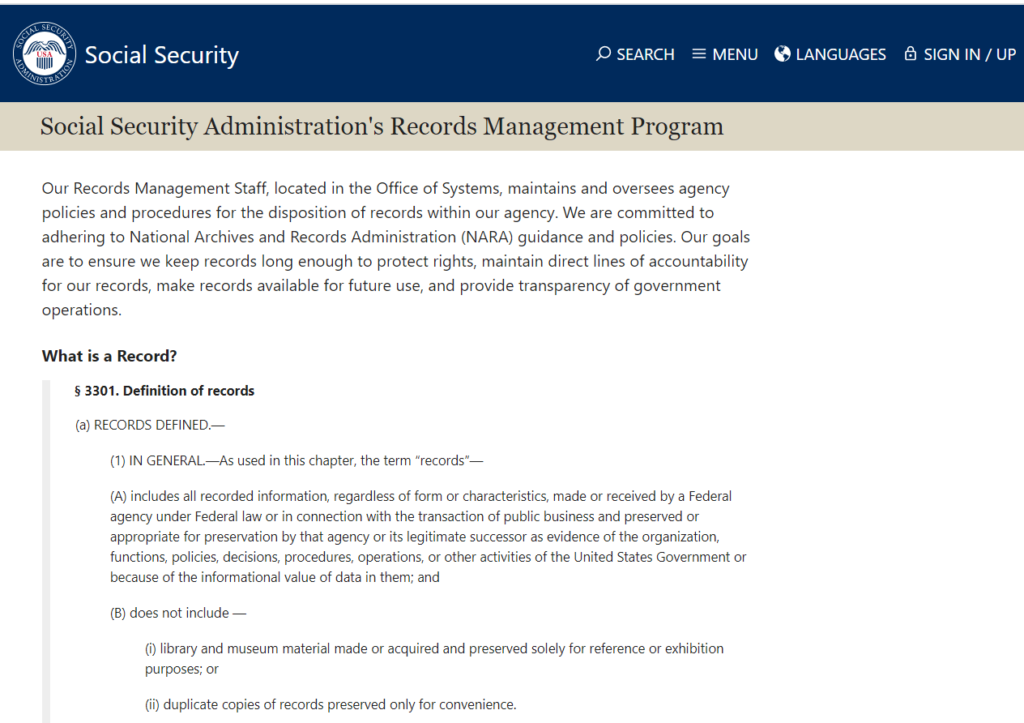
- City Directories
City directories can be extremely helpful in locating the deceased’s residence, especially if you are unsure of when they passed away or where they lived. Prior to the invention of phonebooks, directories were the primary means of assisting people in locating others. Unlike phonebooks, which only contain a person’s address and name, directories frequently include information about the person’s spouse as well as their occupation. For example, if a family’s head passed away and their spouse wished to continue to be listed, the directory would simply refer to the spouse as “widower” or “widow,” or they would update their records to reflect that the household’s head had passed away. City directories are available at the majority of Colorado’s libraries.
- Tax Records
Tax records, which date all the way back to the 18th century, are another source of information on death records information. They have information on the people who have worked for the state in the past. The name of the individual will frequently appear on records from this time period. Following their passing, the individual’s name will be entered into the records as deceased. Modern day records will simply exclude your name from the list of taxpayers that is displayed. Tax records are available in Colorado at the state’s courthouses and libraries, as well as online.
Colorado Death Records FAQs
What is an Official Death Certificate?
An official death certificate refers to a death certificate that is issued directly by the Colorado state government or any similar organization. This document contains information such as the individual’s name, physical address, date of birth, and date of death.
Who Can Request Colorado Death Certificates?
There are restrictions in place in the state of Colorado that aim to limit the number of people who can submit a request for an official death certificate for a deceased person. The following individuals are permitted: the deceased’s spouse, children, siblings, parents, or guardians. Courts and other legal representatives are among the other parties who are permitted to participate. People who are legally authorized by any of the family members listed above, including custodians and guardians, are also permitted to participate.
Are death records in Colorado considered public information?
Because Colorado’s death records are not public information, they are not available for anonymous searches, as they are in many other states. The deceased’s immediate family members, their funeral home, legal representatives, and those who have obtained a certified court order are all among those who are eligible. Death records from 1964 to the present are available at the Local Health Districts, which are located in each county of the state and keep a record of every death.
What Do I Need to Obtain Colorado Death Records?
A primary or two secondary forms of identification must be submitted with every vital records request in the state of Colorado, as mandated by state law. Persons who are eligible to receive benefits include the named individual on the record, their immediate family members, their legal representatives, and individuals who have been authorized by a court order. The existence of an established relationship between the requester and the person(s) named on the record determines whether additional security documents are required.
What’s the difference between a certified record and Authenticated Certificate?
Certified copies of identification documents can be used to establish one’s identity within the state. An authenticated record signed and sealed by the Secretary of State is required when the records are intended for use in a foreign country, but this is not required in all cases. In Colorado, all vital records such as death certificates, are issued as certified copies.
Conclusion
The state of Colorado is extremely particular about the accuracy of its tax and voting records, and this is reflected in its voting record as well. As a result, they strive to keep a comprehensive death record up to date. Following the death of a person in New York, tax collectors contact family members or next of kin to collect any unpaid state taxes that may be owed to the state. In the event of a probate proceeding, these death records will be extremely useful because your family members or next of kin will not have any difficulties in obtaining any legal information. With our comprehensive guide to Colorado death record searches, you’ll be able to locate any type of record that you might require in a matter of minutes.
Disclaimer: OurPublicRecords mission is to give people easy and affordable access to public record information, but OurPublicRecords does not provide private investigator services or consumer reports, and is not a consumer reporting agency per the Fair Credit Reporting Act. You may not use our site or service or the information provided to make decisions about employment, admission, consumer credit, insurance, tenant screening, or any other purpose that would require FCRA compliance.

Copyright © 2025 · OurPublicRecords.org · All Rights Reserved